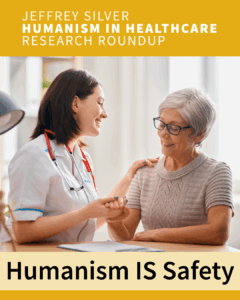
The Jeffrey Silver Humanism in Healthcare Research Roundup features summaries of recently published studies on humanism in healthcare. To receive email notification of new studies once per month, enter your information here and select “Jeffrey Silver Research Roundup” from the checkboxes at the bottom. See previous posts in this series.
Publications from Gold Foundation-Affiliated Authors
Individual, interpersonal, and organisational factors of healthcare conflict: A scoping review
Kim S, Bochatay N, Relyea-Chew A, Buttrick E, Amdahl C, Kim L, Frans E, Mossanen M, Khandekar A, Fehr R, Lee YM. J Interprof Care. 2017 Feb 22:1-9.
This study was supported by a Mapping the Landscape, Journeying Together grant.
This scoping review examines 99 articles from the healthcare literature that reported sources and consequences of conflict associated with individual, interpersonal, and organisational factors. Individual conflict sources included personal traits, such as self-focus, self-esteem, or worldview, as well as individuals’ conflict management styles. These conflicts posed threats to one’s physical, mental, and emotional health and to one’s ability to perform at work. Interpersonal dynamics were hampered by colleagues’ uncivil behaviours, such as low degree of support, to more destructive behaviours including bullying or humiliation. Perceptions of disrespectful working environment and weakened team collaboration were the main interpersonal conflict consequences. Organisational conflict sources included ambiguity in professional roles, scope of practice, reporting structure, or workflows, negatively affecting healthcare professionals’ job satisfactions and intent to stay.
Assessing the culture of residency using the C – Change Resident Survey: Validity evidence in 34 U.S. residency programs
Pololi LH, Evans AT, Civian JT, Shea S, Brennan RT. J Gen Intern Med. 2017 Mar 23
This study was supported by an Arnold P. Gold Foundation Research Institute grant
The authors created and assessed an instrument to assess the culture of residency programs and the clinical learning environment by using it with over 1700 residents in 34 programs in internal medicine, pediatrics, and general surgery. The instrument was able to detect significant differences in the learning environment across programs and sites and provided evidence of validity.
Language-based inequity in health care: Who is the “poor historian”?
Green AR, Nze C. AMA J Ethics. 2017 Mar 1;19(3):263-271.
Dr. Green is a 2013 Gold Professor.
Patients with limited English proficiency (LEP) experience high rates of medical errors with worse clinical outcomes than English-proficient patients and receive lower quality of care by other metrics. The authors argue that we have a moral imperative to provide high-quality care to patients with LEP and to teach our medical trainees that such care is both expected and feasible. Ultimately, to achieve linguistic equity will require creating effective systems for medical interpretation and a major culture shift not unlike what has happened in patient safety.
Addressing palliative care clinician burnout in organizations: A workforce necessity, an ethical imperative
Harrison KL, Dzeng E, Ritchie CS, Shanafelt TD, Kamal AH, Bull JH, Tilburt JC, Swetz KM. J Pain Symptom Manage. 2017 Feb 11.
Dr. Shanafelt is a Mapping the Landscape, Journeying Together grantee.
Clinician burnout reduces the capacity for providers and health systems to deliver timely, high quality, patient-centered care and increases the risk that clinicians will leave practice. This is especially problematic in hospice and palliative care. Efforts to mitigate and prevent burnout currently focus on individual clinicians. However, analysis of the problem of burnout should be expanded to include both individual- and systems-level factors as well as solutions; comprehensive interventions must address both.
Other Publications
Feasibility of a comprehensive wellness and suicide prevention program: A decade of caring for physicians in training and practice
Ey S, Moffit M, Kinzie JM, Brunett PH. J Grad Med Educ. 2016 Dec;8(5):747-753.
Researchers examined a wellness and suicide prevention program for 906 residents/fellows and 1400 faculty in an academic health center. Increased utilization over 10 years, high satisfaction, and consistent institutional support suggest that this comprehensive model of care is feasible and valued.
Developing emotional intelligence in the clinical learning environment: A case study in cultural transformation
Cohen-Katz J, Sternlieb JL, Hansen SE, Dostal JA. J Grad Med Educ. 2016 Dec;8(5):692-698.
As 1 of 14 participants in the national Preparing the Personal Physician for Practice (P4) project, the family medicine residency at Lehigh Valley Health Network implemented a series of curricular changes designed to transform the culture of education. While not all residents in the intervention expressed support for the changes, repeated references to the nurturing educational environment indicate recognition of, and favorable responses to, the creation of an emotionally intelligent learning community.
Well-being in residency: A systematic review
Raj KS. J Grad Med Educ. 2016 Dec;8(5):674-684.
Researchers examined 26 articles that measured resident well-being and associated factors, predictors, effects, barriers, as well as interventions to improve well-being. They found that autonomy, building of competence, strong social relatedness, sleep and time away from work are associated with greater resident well-being. Perseverance is predictive of well-being, and greater well-being is associated with increased empathy. Interventions focused on health and coping skills appear to improve well-being.
Building trust and rapport early in the new doctor-patient relationship: A longitudinal qualitative study
Dang BN, Westbrook RA, Njue SM, Giordano TP. BMC Med Educ. 2017 Feb 2;17(1):32.
Researchers conducted three longitudinal, in-person interviews with 21 patients new to an HIV clinic to learn about the most critical elements for building trust and rapport. Their analysis showed five actions providers should take to build trust early in the first visit: 1) provide reassurance to patients, 2) tell patients it’s okay to ask questions, 3) show patients their lab results and explain what they mean, 4) avoid language and behaviors that are judgmental of patients, and 5) ask patients what they want [i.e., treatment goals and preferences].
Patient-centeredness as physician behavioral adaptability to patient preferences
Carrard V, Schmid Mast M, Jaunin-Stalder N, Junod Perron N, Sommer J. Health Commun. 2017 Mar 3:1-8
Researchers surveyed 244 participating patients before and after their appointments about their preferences for their physician’s interaction style. They found that that female physicians who adapted their nonverbal (but not their verbal) behavior had patients who reported more positive consultation outcomes. Moreover, the more female physicians were accurate interpersonally, the more they showed verbal and nonverbal behavioral adaptability. For male physicians, more interpersonal accuracy was linked to less nonverbal adaptability.
Improving communication between physicians and their patients through mindfulness and compassion-based strategies: A narrative review
Amutio-Kareaga A, García-Campayo J, Delgado LC, Hermosilla D, Martínez-Taboada C. J Clin Med. 2017 Mar 17;6(3).
Communication between physicians and patients is a key pillar of psychosocial support for enhancing the healing process of patients and for increasing their well-being and quality of life. In this article, authors review the potential effect of mindfulness and compassion-based strategies for the improvement of physician-patient interactions.


